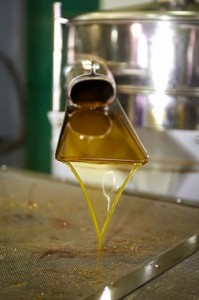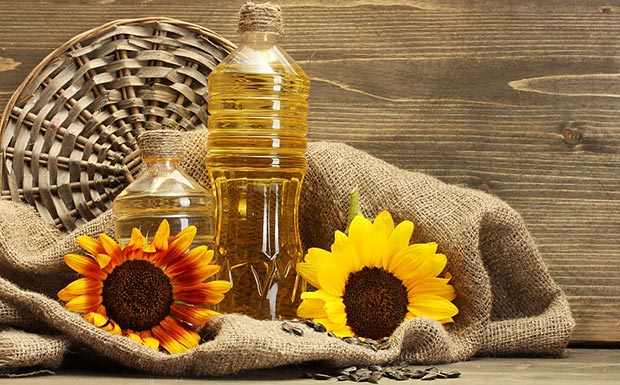Knowing how to make your own vegetable oil is a great skill to have in case a catastrophic event occurs. If you want to make soap, cooking oil, candles, or body oils from scratch, retrieving the oil is step one. This is actually a fun process if you like working with your hands and doesn’t require much in the way of equipment so, if you’re ready, let’s make some oil!
There are many reasons why you may want to make your own vegetable oil and lard. Homemade oils are free of the bleach and other chemicals that are in commercial products. They also taste better and are, in most cases, cheaper to make than to buy. Nut and seed oils are expensive, but for as little as $15 or so, you can grow enough seeds to keep you in oil for the rest of your life.
Getting Started with Vegetable Oil
The first thing that you need to do is decide what type of oil you’d like to use. The entire world of nuts and seeds is at your disposal but some are better than others. It also depends upon what you want to use it for.
{adinserter usdeception}If you want an oil that adds flavor to your food or makes a great-smelling body oil or soap, you may want to use nuts or seeds such as almond, pumpkin, hazelnut, or coconut (yeah, I know – it’s not technically a nut).
If you’re shooting for an inexpensive, all-purpose oil that is easy to grow just about anywhere, sunflower seeds are probably your best bet. There are two different kinds of sunflower seeds – the ones you eat (confectionary) and the ones used for bird seed (black oil). The black oil seeds produce twice the oil and costs about $15 for a 40-pound bag. You get about a quart of oil from a 2-liter bottle of seeds.
The most cost-efficient way to use the seeds that you buy is to plant them and grow an entire crop instead of just using them directly for oil. Sunflowers are easy to grow; they don’t require much space or water to thrive and if you save some seeds back, you’ll never have to buy another bag.
Once the heads sag and the petals fall off at the end of the season, you’ll know that they’re ready to harvest. Lop off the head and hang it up to dry. Then just rub the seeds out with a piece of durable cloth. Easy.
If you’d rather use other nuts or seeds, here are some yields per quart of oil:
- Walnuts – 2.9 pounds
- Hazelnuts – 3.6 pounds
- Peanuts – 4.6 pounds
- Pumpkin and sunflower – 5.3 pounds
Remember that though you may get a lesser yield from pumpkin and sunflower seeds, they’re dirt cheap and a piece of cake to grow compared to nuts!
Making Oil
Oil presses used to be extremely expensive, but you can get small ones that will do just fine for home production for about $125. If you buy used, you can get them even cheaper and they’ll last forever.
You can even make your own. They’re simple pieces of machinery that have a funnel for you to put the seeds in, a crank that you use to push the seeds through the extractor, a heating section that heats the oil, an exit for the oil, and an exit for the pulp. That’s it.
It’s important to clean your press well after you use it though because oils go rancid quickly and you don’t want to ruin a fresh batch.
The process is simple.
- Set up your machine.
- Fill the heating unit with the recommended flammable and light.
- Allow it to heat – this takes about 10 minutes.
- Pour your seeds into the hopper.
- Crank your butt off – it takes about 20 minutes to make 14 ounces of oil. That’s about a 2-liter bottle full of seeds.
- Remove your container of fresh oil and cap tightly.
- Clean your machine.
- Your oil will be black, assuming you’re using black oil sunflower seeds. Once it sets for a few days, the sediment will settle to the bottom.
- Siphon off the oil and discard the sediment.
- Store for up to 2 years in a tightly-sealed container in a cool, dry place.
Different oils have different shelf lives but for the most part, seed and nut oils are good for at least a year, and often 2-3. If the oil is rancid, it will change colors and smell off. The taste won’t be pleasant, either.
That’s all there is to making vegetable oil. You now have a high-quality product to cook with or to use as a base for soap, candles, lamp or bio-fuel or body oils.
This article has been written by Theresa Crouse for Survivopedia.
Photo sources: 123RF.com






















































































Beware of Chinese made presses. They are copies of the Piteba press, made in Holland. Chinese presses are made of stainless steel, which by itself can make your oil toxic. In addition, Chinese stainless steel is terrible quality sometimes containing traces of lead, aluminum, and other heavy metals. Also, instead of being powder coated they are painted with lead based paint.
Thanks to aware us, As i am thinking Piteba press made by China 🙂
HOW DO you get oil from corn? i live in Iowa and we have LOTS of corn and soybeans! I would be very interested in oil from them. Looks like I’m gonna have a bunch of sunflowers this year!!
Corn and soy are almost always genetically modified but besides that, neither are healthy. Please stick with sunflower.
To get oil from corn, you would probably need corn grown all the way hard, like to the stage to make popcorn or cornmeal or get corn seeds from, and then treat it like any other nut or bean. Fresh corn is most often found at the soft, young milk-stage (for straight eating)… but that would be really hard to get oil from, I assume. Using flint-corn (like the decorative ears, often used for cornmeal) might also work for getting oil. probably some varieties are easier than others, but I’m not sure which are better. Just my opinion, maybe worth experimenting with?
Almost all corn oil is expeller-pressed, then solvent-extracted using hexane or 2-methylpentane (isohexane). The solvent is evaporated from the corn oil, recovered, and re-used. After extraction, the corn oil is then refined by degumming and/or alkali treatment, both of which remove phosphatides.
Good article but a link to a reputable seller or maker of home oil press would have been nice. All I could find were ones made in China!
If oil you press should happen to go rancid through improper storage or just length of time, could it be used as a fuel source??? I have never heard this idea addressed in blogs or comments.
Given that some people get used oil from restaurants to fuel their cars, I don’t see why rancid oil can’t be used as a fuel source. I use oil that’s past its expiration date to lubricate machines such as my shredder. It can also be used in oil lanterns, tiki torches, etc.
Yes you can. It might be a bit smelly, but doable. That said, if you’re saving the oils and fats from cooking, those can also be used as fuel.
making my own cooking is going to great
What about olives? Pretty easy to get oil out of olives and you don’t have to use a press. You can also eat them. Healthy and you get a lot of oil with a multitude of uses (eating, cooking, soap, oil lamps etc.). Olive oil is the primary basis of castile soap which can be used for pretty much anything, such as shampoo, laundry and general cleaning. I don’t think it’s surprise that our civilisation started with olive oil. I agree re. some products. I’ve never heard of corn oil but all corn and soy in the US is GM. Wouldn’t touch with a 10 foot pole Anyway crazy to me to grow acres of sunflower or whatever when a handful of olive trees will give you all the oil you will ever need.
The problem being that not all of us live where olives grow.
I was directed to your website searching for DIY plans Ultrasonic Extraction Schematics or further directions. Larry
PLEASE WHERE CAN I GET THE RAW MATERIALS.
GMO corn or GMO soy from evil monsanto? NOT good !! Be very careful with “food” created by the evil science of this evil jewish money system REGIME !!!
Thanks for the knowledge! Another fellow West Virginian here, I have always been passionate about what I can make myself and finding ways to be self dependable from stores and commercial processing. This will definitely help for years to come and it’s crazy that this whole process costs so little but we use these oils everyday.
How can I get raw materials of this recipe? This is an interesting thing to cook well without oil.
Wow this is interesting, how to get the seed sunflower seeds for v ? I want to go into vagitable oil business on my own making.
Pls help me more specifically on how to to make frying oil from palm oil.
I’m highly interested in creating my own cooking oil factory in Africa to help create job for the youths and also to help raise found for educational purposes. I really need help with the kind of seeds I should invest on growing that will yield more oil and the type of machine that will be best for pressing. Any ideas please?
Well, starting an oil milling business is not an easy, as it consider a number of factors to start your oil mill business. For example, you should know what raw material you are going to process, daily capacity, Investment, and where to sold oil etc. One Name I know “Goyum Screw Press” that can help you to start your business. you can visit the website oilexpeller.com
Thanks
Harish
Very good article post.Thanks Again. Keep writing.